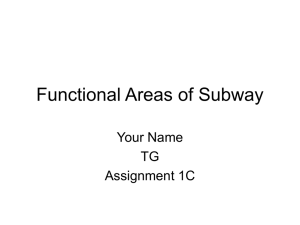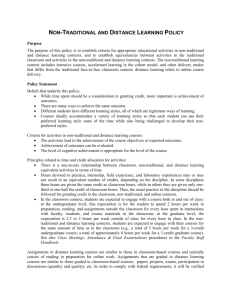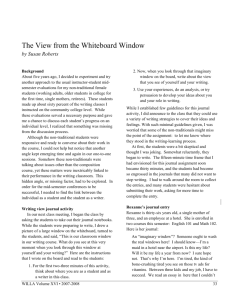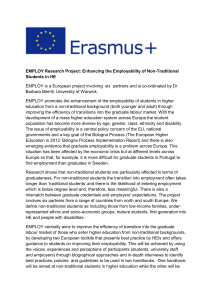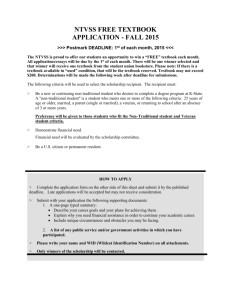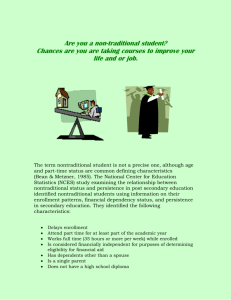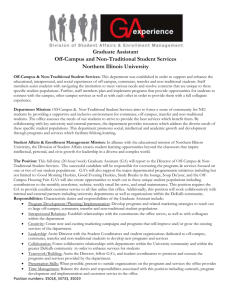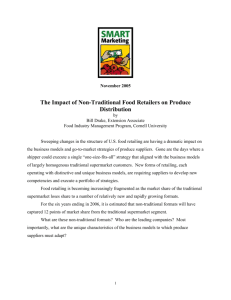Studies in the Education of Adults
advertisement
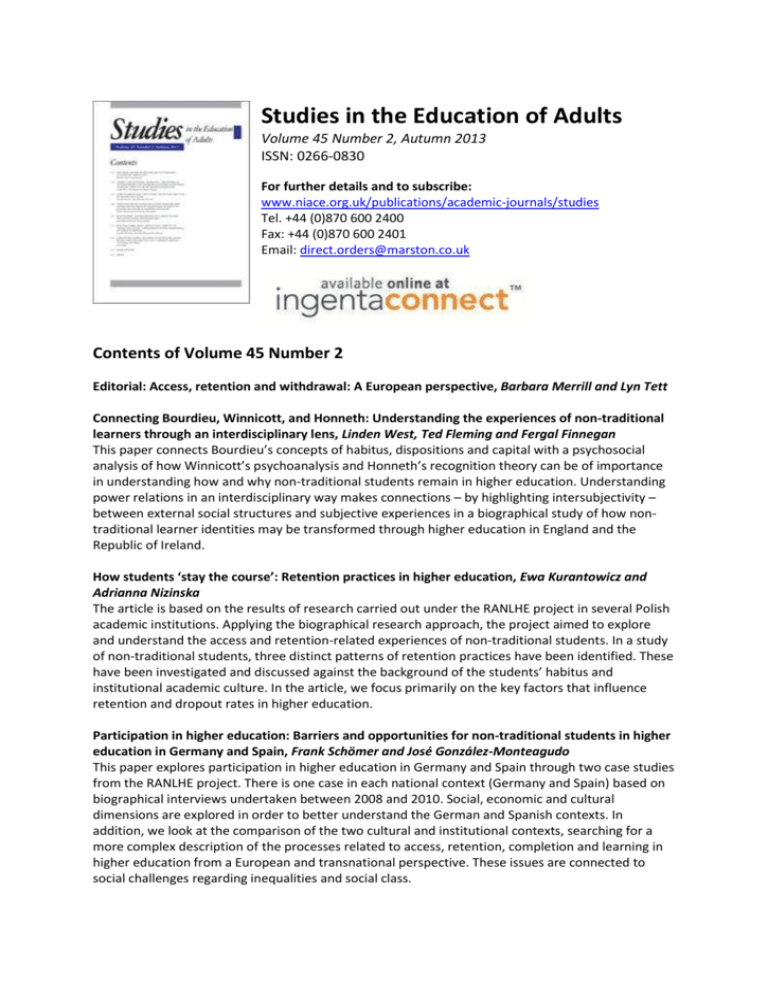
Studies in the Education of Adults Volume 45 Number 2, Autumn 2013 ISSN: 0266-0830 For further details and to subscribe: www.niace.org.uk/publications/academic-journals/studies Tel. +44 (0)870 600 2400 Fax: +44 (0)870 600 2401 Email: direct.orders@marston.co.uk Contents of Volume 45 Number 2 Editorial: Access, retention and withdrawal: A European perspective, Barbara Merrill and Lyn Tett Connecting Bourdieu, Winnicott, and Honneth: Understanding the experiences of non-traditional learners through an interdisciplinary lens, Linden West, Ted Fleming and Fergal Finnegan This paper connects Bourdieu’s concepts of habitus, dispositions and capital with a psychosocial analysis of how Winnicott’s psychoanalysis and Honneth’s recognition theory can be of importance in understanding how and why non-traditional students remain in higher education. Understanding power relations in an interdisciplinary way makes connections – by highlighting intersubjectivity – between external social structures and subjective experiences in a biographical study of how nontraditional learner identities may be transformed through higher education in England and the Republic of Ireland. How students ‘stay the course’: Retention practices in higher education, Ewa Kurantowicz and Adrianna Nizinska The article is based on the results of research carried out under the RANLHE project in several Polish academic institutions. Applying the biographical research approach, the project aimed to explore and understand the access and retention-related experiences of non-traditional students. In a study of non-traditional students, three distinct patterns of retention practices have been identified. These have been investigated and discussed against the background of the students’ habitus and institutional academic culture. In the article, we focus primarily on the key factors that influence retention and dropout rates in higher education. Participation in higher education: Barriers and opportunities for non-traditional students in higher education in Germany and Spain, Frank Schömer and José González-Monteagudo This paper explores participation in higher education in Germany and Spain through two case studies from the RANLHE project. There is one case in each national context (Germany and Spain) based on biographical interviews undertaken between 2008 and 2010. Social, economic and cultural dimensions are explored in order to better understand the German and Spanish contexts. In addition, we look at the comparison of the two cultural and institutional contexts, searching for a more complex description of the processes related to access, retention, completion and learning in higher education from a European and transnational perspective. These issues are connected to social challenges regarding inequalities and social class. Reappraising the importance of class in higher education entry and persistence, John Field and Natalie Morgan-Klein This paper looks at the ways in which experiences and constraints of social class were experienced and ‘storied’ by a group of non-traditional students in higher education. It starts out with reflections on the current status – or rather absence – of class as a key category of critical analysis in adult learning. It then briefly examines the question of class in the context of mass higher education. Motives, commitment and student identity in higher education – experiences of non-traditional students in Sweden, Camilla Thunborg, Agnieszka Bron and Eva Edström Changes in higher education (HE) in Sweden, from elite to mass education, with an increased number of students and institutions, has raised questions about the role of HE in society. Relating to conflicts between discourses of employability, democracy, traditional academic norms and experiences of non-traditional students, the aim of this article is to explore and discuss nontraditional students’ motives for studying as part of the process of the formation of student identities. In this article motives and commitment to HE are two aspects of student identity apparent in student narratives. The material is based on 48 biographical interviews with non-traditional students at three HE institutions. The result shows different motives for entering, dropping out and continuing to study. From these motives, we have identified eight student identity types that are analysed in relation to commitment to HE, and to being a ‘continuer’ versus a ‘drop out’: the altruistic student, the ambivalent student, the car-park student, the life-long learner, the at-risk-offailing student, the instrumental student, the one-track student and the self-realiser. These identity types are further discussed in relation to conflicting discourses of HE in society. Identifying configurations of higher education: Reflections on concepts that compare complex cultural settings, Peter Alheit This paper examines the idea of qualitative comparing in order to create a heuristic concept that will enable relational structures to be examined, drawing on the sociological tradition founded by Norbert Elias. Subsequently, an empirical research example – the comparison of three ‘mentality spaces’ in post-socialist societies in Central Europe drawing on intergenerational biographical data – is used to demonstrate how the theory of figuration can show the way in which underlying historical structures consolidate into a social ‘climate’ that permits certain structures and blocks others. Next, the comparative concept is applied to the core results of the RANLHE project using a typology of the intercultural constellations of HE systems in terms of their efficiency, economy, social responsibility and culture. The national systems of universities in the different countries are then delineated to illustrate the dominant styles of education in terms of their specific figurations. It is concluded that figurations form a complex relational framework between structure and action that possess a certain inner constitutional logic, such as a certain habitus, an aesthetic design principle, mentality spaces or national styles of education. Book reviews Index About Studies in the Education of Adults Published twice a year by NIACE, in spring and autumn, Studies in the Education of Adults is an international refereed academic journal, publishing theoretical, empirical and historical studies from all sectors of post-initial education and training. It aims to provide a forum for the debate and development of key concepts. Each issue normally contains 6–8 refereed articles on academic topics in the education of adults, an editorial and a substantial book review section. Studies in the Education of Adults is published by NIACE in association with the Standing Conference on University Research and Teaching in the Education of Adults (SCUTREA) and the European Society for Research on the Education of Adults (ESREA).
